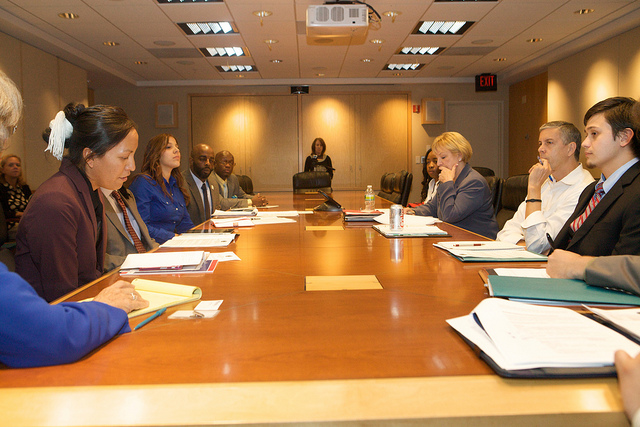
Leaders from the National Council of Young Leaders met with Secretary Duncan as part of his regular Student Voices series. Official Department of Education photo by Leslie Williams.
They are resilient. They are smart. They are united. They have beaten the odds and last week six leaders from the National Council of Young Leaders met with Secretary Arne Duncan and Deb Delisle, assistant secretary for elementary and secondary education to share their recommendations for increasing opportunities for youth and decreasing poverty.
The National Council of Young Leaders is a newly established council with a diverse group of young people. The council, which launched on September 19, has 14 founding members ranging in ages 18-34, representing both urban and rural low- income areas, who advise policy makers, business leaders and foundations on issues affecting low-income youth and their communities.
Secretary Duncan encouraged the students to be straight forward, “We’re always trying to have a real candid conversation about what we’re doing well, and what we’re not doing well,” he said. “We feel this huge sense of urgency to improve what’s going on around the country.”
In August and September the council researched issues and used their personal experiences to create a comprehensive list of six recommendations they believe will help create safe, welcoming, opportunity-rich communities for every child born in America.
Ending the school-to-prison pipeline was of great concern to the council. Ladine Daniels shared his experience of struggling to re-enter society having been through the school-to-prison pipeline. “One of my biggest problems with the criminal justice system,” Daniels explained. “Is that too often the time doesn’t fit the crime and we don’t have a lot of opportunities when we get out of jail because we’re still looked upon as criminals.”
What kept Daniels from re-incarceration was a mentor who introduced him to the “Pathways to a Green Economy” program. The program provides people who are ex-offenders, a single parent, or low-income the opportunity to learn marketable skills for the green economy. Secretary Duncan mentioned restorative justice concept , emphasizing repairing the harm caused by criminal behavior, which is incorporated in ED’s Correctional Education work.
Council member, Anays Antongiorgi, discussed the importance of keeping students engaged in school by providing them culturally relevant curriculum and high-quality teachers who are passionate, culturally competent and incorporate strengths-based youth development in their approaches to teaching.
“I had two teachers that were very caring, however they were teaching 200+ students so they didn’t have time to provide me with individual attention,” Antongiorgi said. “Nor did they provide classroom materials that supported my learning style.”
In reflecting on the meeting, Secretary Duncan noted that “it is powerful to see a Council with different mix of people ethnically and geographically- rural, urban, suburban speak with one voice, even though you don’t agree on everything. You are all leaders and could teach us here in Washington a thing or two.”
Read the Council’s policy call to action Recommendations to Increase Opportunity and Decrease Poverty in America.
Samuel Ryan is a regional and youth outreach associate in the Office of Communications and Outreach






I am excited about the Council beginning its work on influencing policy with the interest of low-income students on their minds. Coming from a low-income high school, I remember that I had very little resources for things like career planning and preparation. If I hadn’t had the opportunity to go to college, I would feel completely unprepared for the “real world” coming out of high school.
I hope that youth advocates and groups like the National Council of Young Leaders will be able to point policy-makers toward solutions that will benefit students like me and my classmates who might not have been given the necessary resources to be successful in a career.
Congratulations to the National Council of Young Leaders for your great work! You are already making a difference, and with far more to come.
Thank you Secretary Duncan for your consistent support for engaging young people themselves in shaping the nation’s education policies.